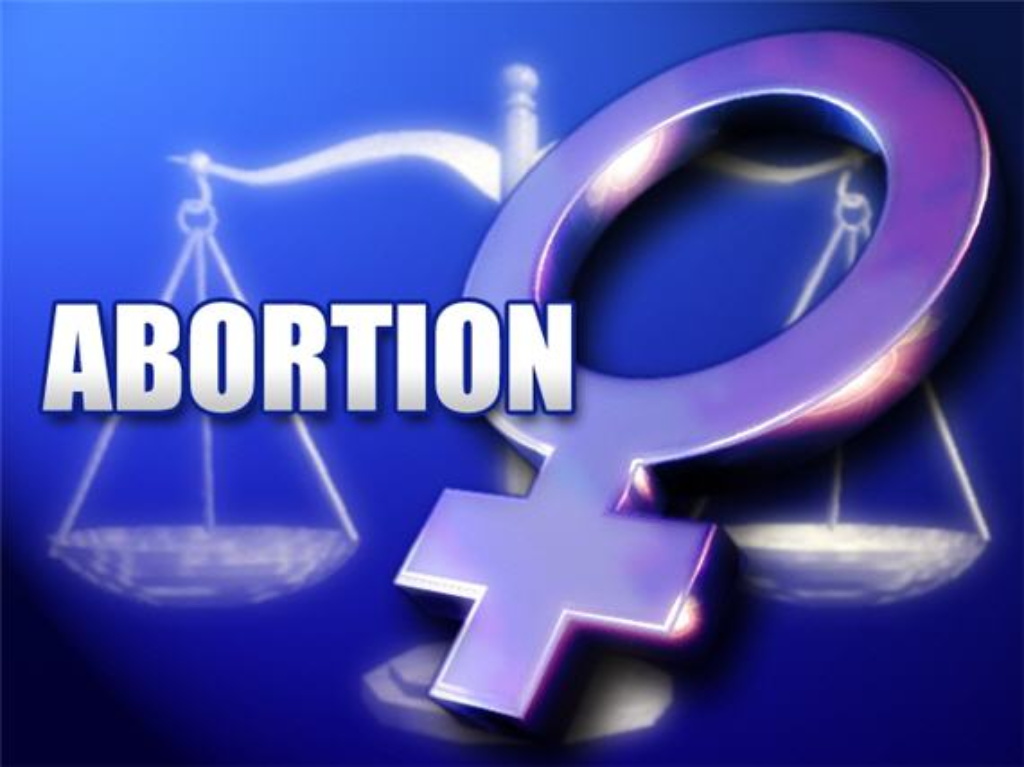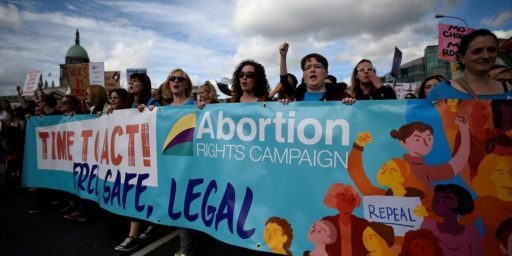Effort To Liberalize Abortion Laws Shifts To Northern Ireland
The overwhelming success of the abortion referendum in Ireland is leading to calls for similar action in Northern Ireland, but it won't be easy.

The overwhelming success of the referendum to change Ireland’s restrictive abortion laws has developed into a campaign to liberalize abortion laws in Northern Ireland, but the path to getting there would not be easy:
The historic result in Ireland’s referendum on abortion has piled pressure on UK Prime Minister Theresa May to reform the law in Northern Ireland, where terminations are still illegal.
Members of Parliament from across the political divide have called on the UK government to change the law in Northern Ireland, to bring it into line with the rest of the UK and Ireland.
Decision on abortion law are devolved to the Northern Ireland Assembly, but it has been suspended for more than a year, due to a political deadlock.
May’s government depends on support from the Democratic Unionist Party of Northern Ireland, a deeply conservative party that opposes any attempt to ease restrictions on abortion.
Abortion was legalized in the rest of the UK in 1967, but the liberalization was never extended to Northern Ireland.
“The Government must act to ensure that women in Northern Ireland have the same rights as women across the rest of the UK,” said Labour MP and Shadow Equalities Minister Dawn Butler on Twitter.
“Labour is calling for the Government immediately to begin negotiations with political parties in Northern Ireland about legislation to extend abortion rights.”
n a statement, DUP leader Arlene Foster said: “Friday’s referendum has no impact upon the law in Northern Ireland, but we obviously take note of issues impacting upon our nearest neighbor.”
“The DUP is a pro-life party and we will continue to articulate our position. It is an extremely sensitive issue and not one that should have people taking to the streets in celebration.”
More than 160 MPs, including some Conservatives, have written to May demanding she allow a referendum on relaxing the abortion laws in Northern Ireland. The UK’s Royal College of Midwives also supports such a move.
As noted, abortion laws are far different in Northern Ireland than they are in the rest of the United Kingdom. Since 1967, the law in England, Scotland, and Wales has essentially provided that abortions are available for any reason up to roughly the 24th week of pregnancy and are also available beyond that if the pregnancy is a threat to the life or health of the mother or if the fetus has serious birth defects. This makes the United Kingdom one of the nations in Europe that has some of the most liberal laws on abortion. Northern Ireland, though, has been a different story. To a large degree, the current state of the law in that part of the United Kingdom is not very different from those in the Irish Republic notwithstanding the fact that Northern Ireland is less influenced by the Catholic Church rather than its neighbor to the south. The current law in Northern Ireland only allows abortion if a woman’s life is at risk or there is a”permanent or serious risk” to her mental or physical health. There are no exceptions for defects in the fetus that would constitute serious birth defects, or for pregnancies that are the result of rape or incest.
Politically, the matter is made more difficult by the fact that politics in Northern Ireland is currently dominated by the Democratic Unionist Party, a party that is far more conservative in the American sense than the Conservative Party in the United Kingdom or even the conservative parties in the Irish Republic. This is also reflected in the fact that same-sex marriage remains banned in Northern Ireland notwithstanding the fact that it has been legal in both the rest of the United Kingdom and in the Irish Republic since 2015. There are apparently legal mechanisms by which Parliament in London could take it upon itself to change Northern Ireland’s abortion law, but the fact that British Prime Minister Theresa May is currently in power in no small part due to the support of the DUP makes it unlikely that such a law is going to be brought to the floor any time soon.
Notwithstanding these political considerations, the result last week in the Irish Republic is leading many citizens of Northern Ireland to push for action on the laws regarding abortion in their own nation:
Ireland’s vote on Friday to end its near ban on abortion, overwhelmingly supporting change in what used to be a bastion of Roman Catholic influence, has inspired many calls in Belfast, London and elsewhere for similar liberalization in British-ruled Northern Ireland, whose draconian laws governing the termination of pregnancy date to the 19th century.
“Women should have a choice,” said Kirsten Partwistle, 20, who was selling ice cream outside the Belfast City Hall, where a rally of around 700 people gathered on Monday. “It’s time for Northern Ireland to have abortion rights.”
She added that she would be participating in campaigns for abortion rights. “One hundred percent,” she said. “Hopefully we’re moving forward now.”
Yet while the Irish vote has given new momentum to Northern Ireland’s advocates for lifting its near ban, the pathway is far more complicated than it was in Ireland, which involved a relatively straightforward process of repealing a constitutional amendment.
Northern Ireland has blocked all efforts from London to liberalize its abortion law, which permits termination only if the life of the woman is endangered. There are no other exceptions — not rape, incest or fatal fetal abnormality — and those violating the ban could in theory, as Mr. McNally said, be given a life sentence.
While opinion polls consistently show that a majority of people in Northern Ireland want abortion to be available, across both Catholic and Protestant groups, the issue has become entangled in the sectarianism that is currently strangling politics here, where the National Assembly has been suspended for more than a year.
While Sinn Fein said after Friday’s vote in Ireland that the campaign for liberalized abortion laws would spread to the north, traditionally all political parties in Northern Ireland have been against allowing abortion, said Eleanor Crossey Malone, an organizer of ROSA, an abortion rights group.
“The main reason we’re behind — and we don’t have marriage equality either — is because of our sectarian past and because we still live in a deeply divided society,” she said. “People still vote on sectarian lines rather than on social issues, because they want to keep the other side out. The sectarian situation allows this issue to be swept under the rug.”
Because of that, she said, “there is a sense that change is not possible here — it all comes down to the sectarian stalemate. But young people are getting impatient over the lack of political will.”
For many women in Northern Ireland, of course, it’s possible to simply travel to Scotland, England, or Wales to obtain an abortion that would otherwise be illegal where they live. Additionally, the upcoming changes to the laws in the Irish Republic will likely mean that women seeking an abortion will simply cross the border to obtain one. Currently, this is quite easy given the fact that the United Kingdom and Ireland are members of the European Union and the border between the two of them is relatively easy to pass through. Even after Brexit is complete, though, this is likely to remain the case given the fact that the United Kingdom, Northern Ireland, and Ireland have stated publicly that they intend to remain committed to the same type of liberalized border policy that they’ve had under the E.U.. although the process of getting to an agreement on that issue has proven to be more difficult than anticipated. In many cases, though, women can’t afford to fly to the rest of the U.K. or to travel at all. In those cases, they are reduced to using medication designed to induce abortions, usually without medical supervision. In many cases, this has led to the expected results.
Last week’s vote in the Irish Republic appears to be changing the political winds in Northern Ireland to some extent on this issue, whether it will be enough to lead to changes in the law, though, remains to be seen.





Doug–what’s probably holding this even more back is the fact that NI doesn’t have a local government at this time and Westminster is terrified of trying to run anything as controversial as a vote on abortion from London (which would have all sorts of metaphorical messages.)
Hence the frozen-in-the-headlights look of Theresa May and the rest of her coterie.
(By the way, the fact that NI doesn’t have the same laws that England has on abortion shoots a big fat gaping hole in NI’s argument of absolutely insisting they be a regulatory twin of England–which is what is holding up the whole Brexit “solve the border problem” thing.)
Based on my acquaintance with quite a few ‘Reformed’ (ie–Calvinist from root to branch) Christians, abortion rights in protestant Ireland are much more distant than they ever were in Eire.
(FWIW: the ‘preview’ still is broken. My proofreading is crippled. I might mis-use ‘shall’ vs ‘will’ anytime and lose my commenting privileges.)